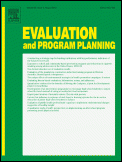
EVALUATION AND PROGRAM PLANNING
Scope & Guideline
Innovating Methodologies for Impactful Planning.
Introduction
Aims and Scopes
- Evaluation Methodologies:
The journal emphasizes various evaluation methodologies, including qualitative, quantitative, and mixed-method approaches. This includes the development of innovative frameworks and tools for effective evaluation. - Program Implementation and Assessment:
A core focus is on the assessment of program implementation, identifying factors that influence success or failure, and evaluating the fidelity of program delivery. - Policy Evaluation:
The journal addresses the evaluation of public policies and their impacts, providing insights into how policies can be better designed and implemented for improved outcomes. - Capacity Building:
There is a strong emphasis on building evaluation capacity within organizations and communities, focusing on enhancing skills and competencies for effective evaluation practices. - Community Engagement and Participatory Evaluation:
The journal promotes participatory evaluation approaches that engage stakeholders in the evaluation process, ensuring that diverse perspectives are considered. - Health and Social Interventions:
A significant portion of the research published pertains to evaluations of health and social interventions, particularly those aimed at vulnerable populations.
Trending and Emerging
- Integration of Technology in Evaluation:
There is a growing trend towards incorporating technology in evaluation practices, including the use of digital tools for data collection and analysis, as well as online platforms for stakeholder engagement. - Focus on Equity and Inclusion:
Emerging themes highlight the importance of equity and inclusion in evaluation processes, emphasizing the need to consider diverse perspectives and outcomes for marginalized communities. - Realist and Theory-Based Evaluations:
An increasing number of publications are adopting realist evaluation and theory-based approaches, which seek to understand the mechanisms and contexts that influence program outcomes. - Sustainability in Program Evaluation:
There is a notable rise in research focused on sustainability, exploring how programs can be designed and evaluated to ensure long-term impacts and resilience. - Collaborative and Participatory Approaches:
Collaborative and participatory evaluation methods are gaining traction, emphasizing stakeholder engagement and co-creation of evaluation processes to enhance relevance and utility. - Mental Health and Well-Being Evaluations:
The journal is seeing a rise in evaluations related to mental health and well-being, particularly in response to the growing recognition of mental health as a critical area for intervention and evaluation.
Declining or Waning
- Traditional Evaluation Models:
There is a noticeable decrease in the publication of papers focused solely on traditional evaluation models, suggesting a move towards more dynamic and integrated approaches that consider context and complexity. - Single-Domain Evaluations:
Research that focuses on single-domain evaluations (e.g., education or health) appears to be declining in favor of interdisciplinary studies that address multifaceted issues across domains. - Descriptive Evaluations without Actionable Insights:
Papers that provide purely descriptive evaluations without offering actionable insights or recommendations are becoming less common, reflecting a demand for evaluations that lead to tangible improvements. - Evaluating Static Programs:
The evaluation of static programs, which do not adapt to changing contexts or needs, is waning, as there is a shift towards more adaptive and responsive evaluation practices.
Similar Journals

Studies in Graduate and Postdoctoral Education
Exploring New Horizons in Educational Quality and OutcomesStudies in Graduate and Postdoctoral Education, published by Emerald Group Publishing Ltd, is a leading journal that serves as a pivotal platform for advancing knowledge in the fields of graduate and postdoctoral education. With an impressive impact factor and a robust ranking, being classified in the Q2 category of education, this journal aims to bridge the gap between research and practice, fostering innovative approaches aimed at enhancing educational quality and outcomes for graduate and postdoctoral learners. The journal welcomes contributions that explore diverse themes such as teaching methodologies, program evaluation, policy impacts, and the global challenges facing higher education. With its Scopus rank placing it in the top tier of the Social Sciences Education category, it is an invaluable resource for researchers, professionals, and students committed to making significant strides in educational practices. As an indexed journal, it enhances visibility and impact, solidifying its position as a critical resource in the evolving landscape of higher education, making it essential for scholars and practitioners alike to engage with its rigorous research and insights.

Administracao Publica e Gestao Social
Illuminating the path to effective governance and community engagement.Administracao Publica e Gestao Social is a leading academic journal dedicated to the fields of public administration and social management, published by UNIV FEDERAL VICOSA in Brazil. With an ISSN of 2175-5787, this Open Access journal has been a vibrant resource for researchers and practitioners since its establishment in 2009, aiming to foster knowledge exchange and collaboration in the public sector. The journal focuses on illuminating the intersections between administrative practices and social policies, offering a platform for original research, case studies, and theoretical discussions that contribute to the advancement of effective governance and community engagement. By promoting open access scholarship, it ensures that invaluable insights are available to a global audience, ultimately influencing public policy and administration practices worldwide.
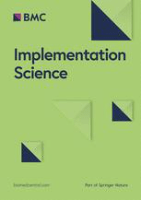
Implementation Science
Leading the charge in implementation science for global health advancement.Implementation Science is a premier open-access journal published by BMC that has been at the forefront of advancing the field of implementation research since its inception in 2006. With an impressive reputation, this journal has consistently ranked in the Q1 quartile across various categories including Health Informatics, Health Policy, Medicine, and Public Health, reflecting its significant impact and relevance in shaping policy and practice. The journal's robust metrics, including a Scopus rank of #7 in Health Policy and #15 in Public Health, underline its credibility and the high-quality scholarship it publishes. By providing an open access platform, Implementation Science ensures that vital research findings reach a broad audience, facilitating knowledge translation and improving health outcomes on a global scale. Researchers, practitioners, and students engaged in the fields of health services research, policy implementation, and public health will find this journal to be an invaluable resource in their quest for evidence-based solutions.
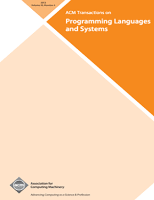
ACM TRANSACTIONS ON PROGRAMMING LANGUAGES AND SYSTEMS
Pioneering Research for a Dynamic Computing LandscapeACM Transactions on Programming Languages and Systems (ISSN: 0164-0925, E-ISSN: 1558-4593) is a prestigious journal published by the Association for Computing Machinery, focusing on advancing the field of programming languages and systems. Established in 1979, this enduring publication has become a significant resource for researchers and practitioners alike, with a convergence extending to 2024. The journal maintains a strong presence in the academic community, currently placed in the Q2 category for Software in 2023, demonstrating its commitment to high-quality research. With a Scopus ranking of #260 out of 407 in Computer Science Software, it highlights a unique niche that bridges theoretical foundations and practical implementations. Although it does not offer open access, the journal ensures quality dissemination of tools, methodologies, and innovations that cater to both seasoned professionals and emerging scholars. The ACM Transactions on Programming Languages and Systems thus plays a crucial role in shaping the future of programming languages and their applications, making it an essential read for anyone vested in the field.
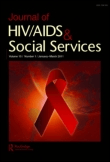
Journal of HIV-AIDS & Social Services
Transforming perspectives on HIV-AIDS with dedicated scholarship.Journal of HIV-AIDS & Social Services is a pivotal academic platform committed to advancing the understanding and management of HIV-AIDS through the lens of social services. Published by Routledge Journals, Taylor & Francis Ltd, this journal spans significant years from 2002 to 2024, making it a key resource for the latest research and practices in the intersecting fields of health and social sciences. With an ISSN of 1538-1501 and an E-ISSN of 1538-151X, the journal holds a respectable position within the academic community, marked by its categorization in the Q3 quartile of both Health (Social Science) and Infectious Diseases as of 2023. The journal strives to provide a forum for innovative research addressing the complexities of HIV-AIDS, incorporating perspectives from various stakeholders, including healthcare providers, policymakers, and community organizations. Although it currently does not offer open access options, its indexed presence and dedicated readership ensure the dissemination of vital knowledge in a field that is more critical than ever. For researchers, professionals, and students dedicated to combating HIV-AIDS, this journal serves not just as a publication, but as a catalyst for change in global health initiatives.

Ager-Revista de Estudios sobre Despoblacion y Desarrollo Rural
Exploring the Dynamics of Rural ResilienceAger-Revista de Estudios sobre Despoblacion y Desarrollo Rural, published by PRENSAS UNIV ZARAGOZA, is a distinguished academic journal focused on the critical fields of demography, rural development, and geography. With an ISSN of 1578-7168 and E-ISSN of 2340-4655, this journal serves as a vital resource for researchers, professionals, and students dedicated to understanding the dynamics of population decline and sustainable development in rural areas. The journal has gained recognition for its quality, evidenced by its placement in the Q3 category across multiple domains in the 2023 rankings, including Demography, Development, and Geography, Planning and Development. Additionally, it holds impressive Scopus ranks, notably at 48th percentile in Demography and 78th percentile in Anthropology. With contributions from eminent scholars and practitioners, Ager not only disseminates high-quality research but also nurtures discourse on policy implications and innovative solutions for rural challenges. The journal is open access, fostering broad accessibility and encouraging scholarly dialogue in the critical study of population and rural development. Whether you are a seasoned researcher or an emerging scholar in the field, Ager provides a platform for impactful insights and collaboration in tackling pressing rural socio-economic issues.
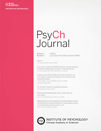
PsyCh Journal
Championing Excellence in Psychological Scholarship.PsyCh Journal, published by Wiley, is a prominent platform in the field of psychology, particularly recognized for its contributions to miscellaneous psychology disciplines since its inception in 2012. With an ISSN of 2046-0252 and an E-ISSN of 2046-0260, this journal has established a substantial reputation within academic circles, currently holding a Q2 category ranking in psychology. Over the years, it has facilitated the dissemination of high-quality research, fostering a deeper understanding of pivotal psychological concepts and practices. As of 2023, it ranks #113 out of 216 in the general psychology category on Scopus, placing it within the 47th percentile. Although not an open-access journal, PsyCh Journal provides necessary access options, ensuring that researchers, students, and professionals can explore its content to enhance their expertise and knowledge in the evolving landscape of psychological research. Set against the backdrop of the United Kingdom, with its headquarters in Hoboken, NJ, this journal thrives on the commitment to advancing psychological science and encouraging innovative approaches in research.
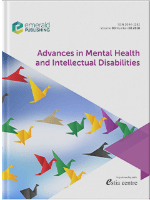
Advances in Mental Health and Intellectual Disabilities
Advancing knowledge at the intersection of mental health and intellectual disabilities.Advances in Mental Health and Intellectual Disabilities, published by EMERALD GROUP PUBLISHING LTD, is a vital academic journal that focuses on the intersection of mental health and intellectual disabilities. With an ISSN of 2044-1282 and an E-ISSN of 2044-1290, the journal provides a platform for innovative research and critical discussions from 2010 to 2024. Positioned in the Q3 category for Psychiatry and Mental Health, it ranks #389 out of 567 journals in its field on Scopus, placing it in the 31st percentile, which underscores its relevance amidst the growing body of research. The journal aims to disseminate high-quality empirical studies, review articles, and case studies that contribute to the improvement of mental health practices and policies affecting individuals with intellectual disabilities. Despite its current non-open access status, it remains a crucial resource for researchers, professionals, and students dedicated to advancing knowledge and promoting best practices within this important area of healthcare.

Review of Policy Research
Shaping the future of policy research through rigorous inquiry.Review of Policy Research, published by WILEY, is an esteemed journal dedicated to advancing scholarship in the fields of public administration, political science, sociology, and environmental management. With an ISSN of 1541-132X, the journal encompasses a diverse range of policy-related issues and provides a platform for critical analysis and innovative research aimed at understanding the dynamics of policy formulation, implementation, and evaluation. As of 2023, it holds prestigious Q1 and Q2 rankings across several relevant disciplines, underscoring its importance in the academic landscape, with Scopus rankings placing it in the top 15% of political science journals and in the top 20% for public administration and sociology. The journal does not offer open access, thereby allowing for a curated collection of high-quality articles that are rigorously peer-reviewed. With a history spanning from 1981 to the present, the Review of Policy Research continues to be an essential resource for researchers, professionals, and students who seek to deepen their understanding of policy development and its broader implications.

EVALUATION REVIEW
Exploring Innovative Insights in Evaluation StudiesEVALUATION REVIEW is a premier academic journal published by SAGE PUBLICATIONS INC, focusing on the critical evaluation practices within the fields of Arts and Humanities as well as Social Sciences. Since its inception in 1977, this journal has played a crucial role in advancing knowledge and methodologies for evaluation studies, providing a platform for researchers, analysts, and practitioners to share their insights and innovative approaches. With a commendable impact factor denoted by its ranking in Q2 of both Arts and Humanities and Social Sciences categories, this journal asserts its influence by being positioned in the 76th and 70th percentiles respectively. Though the journal does not operate under an open access model, its rigorous peer-reviewed articles ensure high-quality contributions that remain pivotal for ongoing discourse in evaluation theory and practice. The journal not only fosters scholarly examination but also emphasizes practical implications, making it an essential resource for professionals engaged in policy making and program evaluation across diverse sectors.